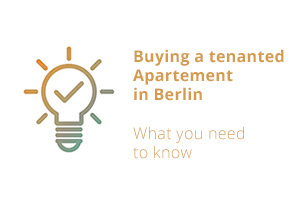2017-12-21 | Buying a tenanted apartment in Berlin: Part 2

Buying a tenanted apartment in Berlin: Part 2
Buying a tenanted apartment as an investment
More and more people are looking towards Berlin as a place to invest in property. The city is lively and vibrant and growing in popularity for both creative and business professionals. The city’s vitality and relative affordability is offering many new opportunities and real estate investment is at the top of the list.
A popular form of property investment these days is the purchase of a tenanted apartment with the aim to rent out. In Berlin, buying a tenanted apartment is a relatively stable investment both because of the high desirability of the city as well as the rules and regulations around property, which provide a systematic and steady environment. What new investors need to be well aware of is the importance that German laws put on the tenant themselves. Berlin is a rental city, and the tenants are well protected, so knowing the rights of the buyer and the rights of the tenant is pivotal when taking that step to buy a tenanted apartment.
Advantages to buying a tenanted apartment in Berlin
Tenanted apartments tend to be around 30% cheaper than the average purchase price of a comparable untenanted apartment due to the rules and regulations, which a buyer will need to follow. Looking at tenanted apartments also offers a wider variety of choice, and a better possibility to find the right property in the neighborhoods that the buyer is most interested in. Each neighborhood in the city offers a uniqueness, and understanding the quirks and pros and cons of the areas will help a buyer make an informed and well-rounded decision on the current and potential value of the property as well as possible future tenants. Also because the rental yield tends to be lower, a buy-to-let mortgage is often more reasonable as well, making it easier to become a property owner.
Rental Yield and Possibilities
Rental yields from tenanted apartments sit around 2-3%, but they can go up to 4-5%. The rules around tenanted apartments favor the tenant, so it’s important for buyers to read the contracts thoroughly and understand what they can and cannot do. Firstly, rent cannot be raised immediately after purchase of an apartment certain. Rent can be made if certain renovations are made which elevate the value of an apartment. If legitimate renovations such as improved bathrooms, windows, flooring, and energy efficiency are made, then the rent can go up, but it can never exceed the current “mietspreisspiegel” or rental index, which provides information on average property rents based throughout different districts. The “mietspreisspeigel” is a guideline for tenants and landlords and an important tool for adjusting rents depending on area and condition/amenities of the apartment.
While rent can be raised to a certain amount if renovations are made, it’s still pivotal for a buyer to read and understand the contract of the current tenant. Different contracts protect the tenants rights for different periods of time, so knowing when the contract was sign will help a buyer plan for the future. For example, if a property was divided into apartments, a tenant is protected under the agreement of the contract for 10 years after the signing of the contract.
Protection of tenants in Berlin
Berlin also has clauses, which require the tenant to be offered the right to purchase a property first. It is rarely the case that a tenant will purchase the property, but, legally, the offer must be made. As was mentioned, Berlin protects its tenants well, but this is a positive element as it provides a better social climate and better trust and communication between property owner and tenant. In general tenants in Berlin also take good care of their homes as well. Strong communication is one of the best policies when it comes to purchasing a tenanted apartment in Berlin, because tenants are more likely to cooperate if given information in a timely manner. Once a purchase is made, and a good flow of information and communication is set up between landlord and tenant, the systematic element of the rules kick in, and the investment has the advantage of staying predictable and relatively stable.


